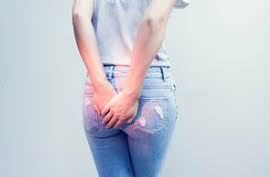What are hemorrhoids?
Hemorrhoids are swollen veins of the rectum that are very common among patients. They can be internal or external. Internal hemorrhoids are hidden inside the rectum and not seen. External hemorrhoids can be seen or felt on the outside of the rectum. Both types can lead to symptoms.
What are the symptoms of hemorrhoids?
Symptoms of hemorrhoids can include itching around the skin of the anus, painless rectal bleeding and anal pain. Hemorrhoid bleeding is generally mild, bright red and tends to occur during bowel movements. It can be seen both within the toilet bowl or with wiping. Infrequently, bleeding can be heavy. Although a common cause of rectal bleeding, it is important to discuss any signs of blood in stools or on wiping with your healthcare provider in order to evaluate for any more serious conditions.
How are hemorrhoids diagnosed?
Hemorrhoids are typically diagnosed by physical exam, including a digital rectal examination where your physician will insert a gloved finger into the rectum to feel for any internal hemorrhoids and examine for any signs of bleeding. At times, an anoscope is used to better visualize the inside of the anus. In cases of bleeding, a sigmoidoscopy or colonoscopy may be performed to confirm the source of the bleeding and determine the best course of treatment. For more information on these procedures, please visit our procedures section.
What is the treatment of hemorrhoids?
One of the most common causes of hemorrhoids is chronic constipation. Therefore, initial treatment of hemorrhoids includes prevention of potential causes, such as constipation. Dietary fiber and fluid intake should be increased in order to soften stools. Fiber supplements and laxatives can be used to further treat and prevent constipation associated with the development of hemorrhoids. Another at home measure for the treatment of hemorrhoids are sitz baths. During a sitz bath, the hemorrhoids and rectal area are soaked in warm water to help improve and prevent future symptoms.
Your physician may also prescribe a course of topical therapy. Topical therapies include over-the-counter creams, wipes or suppositories such as Preparation H ®, Tucks ® and Recticare ®. Prescription therapies are generally steroid based and should be used strictly under the supervision of your physician. In the event that dietary and medical treatment alone is ineffective, other treatment options for hemorrhoids include rubber band ligation, infrared coagulation, sclerotherapy or hemorrhoidectomy.
The information provided above is meant to be used as an informative guide for patients. For precise and individualized recommendations, please consult with one of our board certified gastroenterologists to discuss your symptoms.
For additional information or to book an appointment at the Gastroenterology Center of New York, please feel free to reach out to our dedicated team by calling us at 718-210-2960. You can also schedule online or reach out to us via the Contact Us form.
Questions? Our staff is always happy to assist.
Email us at info@gastrocenterofny.com or call us at 718.210.2960






